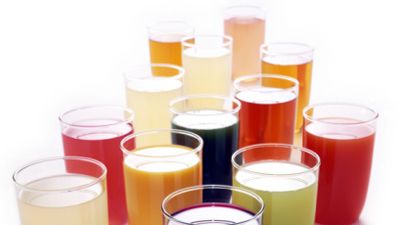4 Ways to Get Your Juice On
Juicing Benefits - Tips on Juicing for Health

In health-minded circles, "juicing" has become a buzzword – and not in the steroid-abuse way. Fresh vegetable juice drinkers – including Madonna and Natalie Portman – extol the panacean power of juice, claiming radiant skin, weight loss, increased energy, and even a cure for cancer. "If there's only one thing you do in the day, you take that time out and have that morning juice," says Ana Ladd-Griffin, a nutrition counselor and business manager for detoxer-to-the-stars Natalia Rose. New York juice emporium Organic Avenue is opening a total of four stores in 2010, including its new outlet in Norma Kamali's flagship boutique. "There's a lot of demand for the juice. It's not a luxury product it's a necessity," says Doug Evans, Organic Avenue CEO. "Most of the Sports Illustrated swimsuit models drink the juice on a regular basis." Juice bars and even home delivery services are popping up everywhere: Ladd-Griffin's program now freezes and ships juice across the country, and Organic Avenue delivers green drinks to subscribers like Gwyneth Paltrow and Naomi Watts – even in the middle of the night. But not all juice packs the punch. Here's what to look for.
1. Greens: While orange or other fruit juices may already be part of your daily routine, it's the veggies that make an impact. "More minerals, less sugars," Evans says. Dark, leafy greens like spinach and kale have important antioxidants and minerals like calcium and iron. "All of the nutrients and enzymes that vegetables carry, if you drink in the juice form, you're mainlining it," says Ladd-Griffin.
2. Organic: Don't assume – ask. Many restaurants will skimp on quality and use "wishy-washy" produce to save money, says Evans of Organic Avenue, which uses only certified organics. For a clear complexion, it's best to stay pesticide-free. "The toxic residue from the conventional produce gets concentrated in the juicing process," Evans says. Some nutritionists claim that if juice is not organic, it's not worth it, because the sprayed stuff does not have the same nutritional value. "They just don't have the same life force," Ladd-Griffin says.
3. Pressed: While centrifugal juicers, which use a spinning process, are the most common, high-tech pressing equipment minimizes produce oxidation, preserving the quality. Fruits and vegetables begin to lose nutrients as soon as they go through the centrifuge, but pressed juices retain their power for three or four days. "There's actually a great fallacy that juice made on demand in front of a consumer is most likely superior to juice made in a certified juicing facility," Evans says.
4. Just juice: Look for juice that is raw, nothing added or processed. Besides containing additives, brand-name juice on the shelf has been pasteurized, which kills vital enzymes. "You're actually changing the metabolic composition of the juice," Evans says, "because it's now dead."
Get exclusive access to fashion and beauty trends, hot-off-the-press celebrity news, and more.